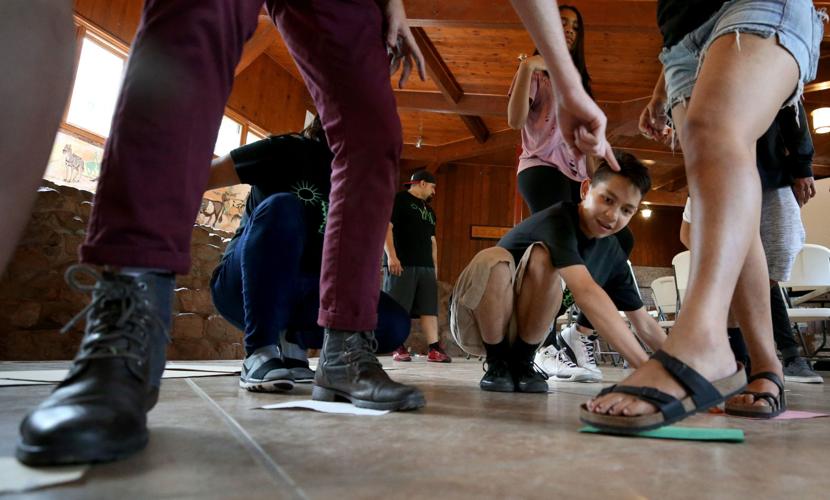Two programs to prevent teen pregnancy in Southern Arizona are in peril due to funding cuts by the Trump administration.
The U.S. Department of Health and Human Services is halting grant funding for its Teen Pregnancy Prevention Program, created by the Obama administration in 2010. The funding affects 81 sites, including sites in Tucson and Phoenix.
Officials with Child & Family Resources, a nonprofit Tucson social-service agency, are trying to figure out how to move forward after the recent and unexpected news that, come June, the organization will lose the final two years of a $7 million, five-year federal grant to prevent teenage pregnancy.
The lost money amounts to $2.8 million for evidence-based programs that have been reaching 3,000 Southern Arizona youths per year. Evidence-based refers to programs shown to improve measurable outcomes.
HHS emailed a statement to the Star that the Teen Pregnancy Prevention Program has shown “very weak evidence of a positive impact” and is proving to be a “poor use of more than $800 million in taxpayer dollars” nationwide.
Federal officials also cited a recent report that sexually transmitted diseases are at record highs as further evidence that the program was ineffective.
HHS says future decisions regarding the program will be guided by science and a “firm commitment to giving all youth the information and skills they need to improve their prospects for optimal health outcomes.”
But grant administrators in Tucson and around the country say the programs have proven effective in continuing a national trend of reduced teen pregnancies.
Teen childbearing has “substantial” social and economic costs, the Centers for Disease Control and Prevention says, including lost tax revenue because of lower education attainment and income among teen moms.
The children of teen moms are more likely to drop out of high school, have more health problems, be incarcerated during adolescence and face unemployment as a young adult, the CDC reports.
Teen birth rates in the U.S. have dropped 8 percent since 2014, the CDC reports. But the rate is still substantially higher than in other industrialized nations, says the Big Cities Health Coalition, a forum for the leaders of America’s largest metropolitan health departments.
Youth Council
The Tucson teens wee quiet for a moment as they thought about the true or false question: A female can become pregnant even if a male does not ejaculate.
The teens, all members of the Child & Family Resources Youth Advisory Council, had divided themselves into two teams for a game they called Who Wants to be a Millionaire: the human sexuality version.
The statement is true because pre-ejaculation can cause pregnancy, one team shouted out, offering the correct answer first.
The teens went on to answer several more rounds of questions with a range of topics, including consent and healthy relationships.
While the teens were enthusiastic during the retreat at the Triangle Y Ranch Camp and Retreat Center north of Tucson, some were also feeling disappointed, they said privately. They had just learned that due to the federal funding blow, the future of the Youth Advisory Council was now uncertain.
The 13 members of the council play an integral role in those programs, acting as ambassadors and advising on curriculum content. They are able to tell grant administrators what’s going on with teens and sexuality, whether it’s sexting or obstacles to getting contraception.
“We start to learn what kids are wondering about that no one is talking about,” said Richard Sosa, a facilitator of Guy Talk, one of the Child & Family Resources pregnancy-prevention programs.
“They advise us on what is lacking,” he said of the youth council.
In August, 20 leaders from the Big Cities Health Coalition, including Maricopa County Department of Public Health Director Dr. Bob England, wrote a letter to HHS Secretary Tom Price asking that the funding be restored. They wrote that cutting it short will halt important research and data analysis midway through the grant process.
Critics of the funding cuts are concerned the influence of top Trump appointees like Valerie Huber, the former president of an abstinence-only organization, are putting morality issues ahead of science.
Huber is now chief of staff to the assistant secretary for health at the Department of Health and Human Services. In March, Huber wrote an editorial in the publication The Hill that criticized the Teen Pregnancy Prevention Program, saying it “normalizes teen sex.”
“In fact, teens report that these programs make them feel pressured to have sex. More pressured to have sex, in fact, than the pressure they feel from their dating partners,” Huber wrote.
Big impact in Sunnyside
The grant money provides teen pregnancy-prevention and sex-education programs targeted to students in pockets of Southern Arizona that have higher-than-average teen pregnancy rates.
Those programs include the sole sex education currently offered to students in the Sunnyside School District, a discussion-based program called Guy Talk for boys in Southern Arizona and outreach in the San Xavier District of the Tohono O’odham Nation.
Sunnyside officials say they are doing their best to build capacity in order to sustain the programs on their own after the funding is pulled.
“The curriculum does a great job at framing and addressing the role that our young men and women have in communicating and respecting each other’s boundaries, as well as how to communicate when they are in uncomfortable, non-consenting situations,” Sunnyside spokesperson Victor Mercado said.
“These are skills that will serve them well in college and in early adulthood, and even in navigating abusive relationships, where sex can at times be a form of control,” he said. “If our students don’t have the appropriate refusal skills, this may lead to unwanted pregnancies.”
Called Mobilization for Positive Futures, the grant money has funded programs called “Making a Difference” and “Reducing the Risk” for eighth- and ninth-grade students, as well as “Be Proud, Be Responsible, Be Protective” for Sunnyside teens who are pregnant or already have a child.
Disappointment
The Child & Family Resources Youth Advisory Committee, which advises the agency on its teen pregnancy-prevention curriculum, spoke about the funding cuts during their August retreat at the Triangle Y.
“It makes me pretty sad, honestly. I am disappointed,” said 17-year-old member Miranda Escobar, a senior at Tucson High Magnet School.
“Kids need information and resources to help themselves,” she said. “I didn’t get much information until I joined the Youth Advisory Council. My family members gave me books.”
Some of the grant money — $541,339 per year — went to the Guy Talk program that encouraged frank discussion among Southern Arizona boys, which is a huge need in our culture, said Ysabelle Garcia, also a 17-year-old Tucson High senior and advisory council member.
“There is so much toxic masculinity in our world,” Garcia said. “It’s good for guys to know how to respect themselves, to have good relationships.”
Most of the sex education Garcia recalls having in school was abstinence-only, which she says “isn’t realistic.” The advisory council has opened her eyes, she said.
“I learned about consent on the internet, and that is not a reliable source,” she said.
At the youth retreat, Garcia gave the teens a class in anatomy, among other topics. She also gave a lesson in consent.
“It has to be clear, enthusiastic permission,” she said. “It can’t be mumbled. The other person has to be sober and capable.”
Giovanni Rodriguez, a 14-year-old Palo Verde High School freshman, went through the pilot for Guy Talk after he finished eighth grade in 2016 and said the program’s social interaction stood out most. It wasn’t like a typical class, he said.
“We did things in groups most of the time,” he said. “I learned things like healthy relationships, safe sex, STDs and how to prevent from getting them, and birth-control methods.”
Looking forward
Child & Family Resources will do its best to work with the resources it has and hopes the cuts don’t translate into job loss, said Marie Fordney, its senior director of prevention programs.
One immediate obstacle: Fordney’s team was gathering data from participating students in Guy Talk as part of a five-year study to measure its effectiveness.
The program aims to reduce teen pregnancies by empowering young men to define masculinity for themselves, beyond societal expectations, and to take an active role in healthy relationships, birth control and consent.
“We won’t be able to complete the study,” Fordney said.
Moving forward, one thing Fordney’s agency will not do is an abstinence-only-until-marriage program. It’s better to have no sex education at all, she said.
Among other things, such programming alienates youths who are not heterosexual and youths who have had sexual experiences, including experiences that were not by choice. Those kids just end up feeling ashamed, she said.
The loss of funding “is a really big deal,” she said, “especially since one of the grants has an impact on an entire school district.”





